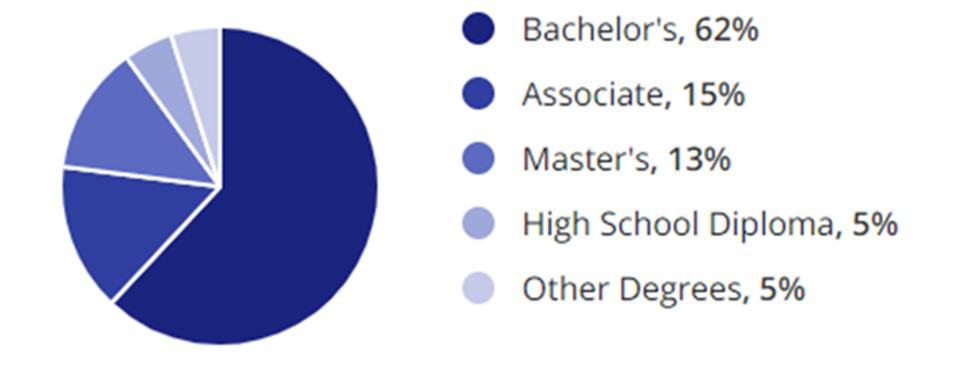Welcome to your comprehensive guide to embarking on a fulfilling career in training! Have you ever considered using your knowledge, skills, and passion to help others grow? A career in the training field could be your calling! This guide is designed to navigate you through the essentials, from educational requirements to the latest hiring trends, popular specializations, and everything in between.
Training jobs are at the heart of workforce development and are pivotal in shaping skilled, competent, and adaptable employees. As organizations continuously evolve, so does the demand for dedicated training professionals who foster innovation, inclusivity, and continuous learning. Whether you’re attracted to corporate trainer jobs, eager to explore CDL training jobs, or interested in specialized fields like athletic trainer jobs, this guide covers the spectrum of opportunities awaiting you in this dynamic profession.
Begin your journey with confidence as we delve into what it takes to thrive in training and development. From understanding the critical skills in demand to uncovering the best pathways for career advancement, this guide is your roadmap to navigating the vibrant landscape of training jobs. Let’s get started on your path to a rewarding training career.
Educational Requirements
Launching a career in training begins with the proper educational foundation. While specific educational demands can vary by role, there are common pathways to enter the world of training jobs. A bachelor’s degree in education, human resources, psychology, or a related field is often the minimum requirement.
Specific licensures or additional certifications might be required for those eyeing specialized CDL training jobs or athletic trainer jobs. For instance, a CDL trainer would need a valid Commercial Driver’s License, while an athletic trainer must meet certification and state licensure standards.
Training professionals’ educational journey doesn’t end with a degree or initial certification. Continuous learning through workshops, webinars, and advanced courses plays a crucial role in staying updated with the latest trends and technologies in training and development.
Areas of Expertise
The training field offers various specializations, each catering to different industry needs. Understanding these areas of expertise allows professionals to focus their skills and pursue careers that match their interests and strengths. Here’s a look at some key areas:
- Corporate Training: This specializes in developing and delivering training programs for business employees. Corporate trainers enhance workforce skills, significantly impacting organizational productivity and growth.
- Technical Skills Development: In industries where technology evolves rapidly, trainers in this specialization focus on keeping the workforce up-to-date with the latest technical skills.
- Leadership and Management Training: Essential for preparing the next generation of leaders, this area focuses on cultivating leadership skills and management capabilities.
- Diversity and Inclusion Training: With an increased focus on building inclusive workplaces, professionals in this area design and implement training to grow understanding and respect for diversity within organizations.
- E-Learning and Instructional Design: This expertise involves creating digital learning materials and courses. As remote work and digital platforms grow, so does the demand for e-learning professionals.
Additionally, niche areas like athletic trainers and paid training jobs offer unique opportunities for those with specific expertise or interests. The diversity within training professions ensures a path for everyone, from tech enthusiasts to those passionate about people development.
To dive deeper into specialized training professions and what they entail, explore various paths, including our Ultimate Guide to Strategy-Planning Jobs and our Ultimate Guide to Pharmaceutical Jobs, and discuss specialized areas within the industries.
Demographics in the United States
Understanding the demographics of training jobs in the United States offers insight into the profession’s diversity and inclusivity. It sheds light on who is shaping the future of workplace learning and development.
Ethnicity/Race:
The ethnicity and race composition within the training profession is diverse, reflecting a broad spectrum of perspectives that enrich the learning environment. Here’s a snapshot:
- White: 59.1%
- Hispanic or Latino: 16%
- Black or African American: 11.2%
- Asian: 6.6%
- Other (Includes Native American, Alaska Native, Two or More Races): 7.1%
This diversity enhances training programs, making them more inclusive and representative of broader societal demographics.

Gender:
The gender breakdown in training jobs showcases the need for a balanced representation:
- Male: 64%
- Female: 37%
A better balance ensures that training and development strategies benefit from diverse perspectives.

Age:
The age distribution among training professionals is widespread, illustrating a mix of experience and fresh ideas:
- Under 30: 11%
- 30-44: 30%
- 45-59: 44%
- 60+: 15%
This blend of generations contributes to a dynamic and innovative training environment where traditional methods encounter cutting-edge practices.
The demographic makeup of the training profession in the U.S. speaks to the field’s commitment to diversity and inclusion. It underscores the industry’s recognition of the value that varied life experiences and perspectives bring to developing impactful training programs.

Salary Trends
Salary is a key component when considering a career path, and in the training field, compensation can vary widely based on several factors, including area of expertise, industry, geographic location, and experience level. Let’s explore the salary trends in training jobs to give you an overview of what you might expect.
- Entry-Level Training Positions: Beginners in the training profession can expect salaries starting around $40,000 annually. Roles such as assistant trainers or coordinators in less specialized areas usually fall within this range.
- Mid-Level Training Professionals: With added experience and certifications, trainers can see their salaries grow between $50,000 and $70,000. Specializations such as corporate trainer jobs often command higher salaries within this bracket.
- Senior-Level Training Experts: Highly experienced professionals, especially those in leadership, technical skills development, or specialty areas like CDL training jobs, can expect salaries upwards of $80,000. Leading corporate training programs or managing large-scale e-learning projects can push compensation well over $100,000 annually.
It’s also worth noting that trainers with skills in digital learning platforms and instructional design are increasingly in demand, reflecting potentially higher earnings. In addition, geographic location plays a significant role, with trainers in metropolitan areas often earning more than their counterparts in smaller cities or rural areas.
The progressing environment of training professions, including ongoing technological advancements and a growing emphasis on diversity and inclusion, suggests that professionals who continuously invest in their development can expect to see their value—and, by extension, their salaries—rise.
Hiring Trends
The hiring landscape within the training profession is dynamic, reflecting shifts in workplace culture, technological advancements, and the continuous need for upskilling and reskilling. As companies aim to foster a culture of constant learning and adaptability, the demand for skilled training professionals shows promising growth. Here are key trends shaping hiring in the training field:
- Growth in E-Learning and Digital Platforms: With more organizations embracing remote work, there’s a surge in demand for professionals skilled in e-learning, instructional design, and digital content creation.
- Emphasis on Diversity and Inclusion: As businesses increasingly recognize the importance of creating inclusive work environments, the need for diversity and inclusion training specialists is rising.
- Upskilling and Reskilling Initiatives: The rapid pace of technological change necessitates ongoing skill development. Training roles dedicated to upskilling and reskilling employees are becoming more prevalent across industries.
- Focus on Soft Skills Development: Beyond technical expertise, there’s a growing appreciation for the role of soft skills. Trainers who can cultivate communication, leadership, and emotional intelligence are highly sought after.
Projected trends suggest a 5% growth in training and development jobs over the next few years. This indicates a healthy demand for professionals, especially those who leverage emerging technologies and align with shifting priorities towards inclusivity and comprehensive skill development.
The evolving nature of training jobs calls for professionals who possess the necessary educational background and certifications and are also adaptable and continuous learners. Staying informed about the latest learning technologies, pedagogical approaches, and workplace trends will be crucial for those looking to thrive in this field.
Education Levels
The education levels within the training profession vary widely, reflecting the diverse range of roles and specialties within the field. However, specific patterns emerge when we examine this sector’s most valued educational qualifications.
- Bachelor’s Degree: A bachelor’s degree represents the entry-level requirement for many training roles. Degrees in education, human resources, business administration, or psychology offer a solid foundation for aspiring trainers.
- Master’s Degree: Professionals looking to advance into higher-level positions or specialized areas such as instructional design or leadership development may pursue master’s degrees. Higher education levels can lead to increased responsibilities and higher salaries.
- Certifications: Specific certifications such as the CPTM or the CPLP are highly regarded. These credentials demonstrate a commitment to the profession and mastery of critical skills.
- Continuous Professional Development: The field of training and development is constantly evolving. Engaging in ongoing professional development through workshops, webinars, and conferences is recommended for staying up-to-date with the latest trends and technologies.
The correlation between education levels and career advancement in the training sector is clear. Higher educational qualifications often lead to better job prospects, highlighting the importance of a commitment to lifelong learning in this dynamic profession. Emphasizing the value of diverse academic backgrounds contributes to a rich, inclusive training environment that addresses various learning needs.

Skills in Demand
Training professionals’ success relies heavily on a blend of technical, interpersonal, and digital skills. As organizations seek to empower their workforce and foster a culture of continuous improvement, specific skills have emerged as highly sought after in the training field. Here’s what employers are looking for:
- Instructional Design: The ability to create engaging and effective learning experiences is paramount. This includes understanding learning theories, curriculum development, and assessment methodologies.
- Technology Proficiency: With the rise of e-learning and digital platforms, familiarity with virtual training environments, learning management systems, and multimedia content creation tools is essential.
- Communication Skills: Effective trainers excel in communication, can convey complex information in accessible ways, and engage with diverse audiences.
- Cultural Competency: As workplaces become increasingly diverse, the ability to design and deliver training that is inclusive and sensitive to cultural differences is crucial.
- Data Analysis: The capacity to analyze training outcomes, assess learner performance, and utilize data to inform instructional decisions is increasingly valuable.
In addition to these core skills, soft skills such as empathy, adaptability, and leadership are equally important. These enable trainers to usher in a supportive learning environment and adapt to the changing needs of their learners and organizations.
When working in the training industry, it’s essential to prioritize personal development and stay current with the latest tools and techniques in adult learning. This is crucial for success and career advancement. To achieve this, it’s essential to consider the needs of different audiences and tailor the information and writing style accordingly. Keep sentences short and direct, using easily understood language. Avoid using acronyms, jargon, and legal language; choose everyday language instead. Use the active voice to clarify who is acting. Remember to organize the information logically, starting with the most essential points.
Current & Future Training Jobs Outlook
The outlook for training jobs is promising, driven by a constant need for skill development and the evolving landscape of workplace learning. As organizations prioritize employee development to remain competitive, the demand for skilled training professionals grows. Let’s look at current trends and future projections:
- Continued Growth: The demand for training and development professionals is expected to rise. This growth is fueled by the ongoing need for businesses to adapt to technological advancements and shifts in market dynamics.
- Digital Transformation: The acceleration of digital learning platforms has opened new avenues for training careers. Professionals with skills in e-learning, instructional design, and digital content creation are particularly well-positioned for the future.
- Focus on Soft Skills: Beyond technical expertise, there is an increasing emphasis on developing soft skills within the workforce, such as leadership, communication, and collaboration. Trainers adept at cultivating these skills will find ample opportunities.
- Diversity and Inclusion: As companies strive to build more inclusive environments, the demand for diversity and inclusion trainers is rising. This trend underscores the importance of cultural competency and inclusive training methodologies.
The future for those in training jobs looks bright, with various paths and specializations to explore. Staying informed on the latest industry trends, technologies, and training methodologies will be essential for those looking to make an impact in this ever-evolving field.
FAQ’s
What Education Is Required for a Career in Training?
A bachelor’s degree in education, human resources, psychology, or a related field is typically the minimum requirement. Additional certifications and continuous professional development can enhance career prospects.
Can I Pursue Training Jobs Without a Background in Education?
Yes, many professionals transition into training roles from various backgrounds. Skills in communication, leadership, and industry-specific knowledge can qualify you for several training positions.
What Is the Average Salary for Training Professionals?
Salaries vary widely based on role, industry, and experience. Entry-level positions may start around $40,000 annually, with senior roles and specialized positions offering $100,000 or more.
Are Training Jobs in Demand?
Yes, there is a consistent demand for training professionals across industries. The need for ongoing employee development and adaptation to technological advancements fuels this demand.
What Skills Are Most Important for Success in Training Jobs?
Successful training professionals often possess a mix of instructional design skills, proficiency in digital learning tools, strong communication capabilities, and cultural competency. Continuous learning is also crucial.
How Can I Advance My Career in the Training Field?
Advancement often involves gaining additional certifications, pursuing higher education, specializing in high-demand areas like e-learning or diversity training, also staying updated on the latest training methodologies and technologies.
Additional Resources
To further explore your interests and expand your knowledge in the field of training, consider delving into the following resources:
- The Association for Talent Development (ATD) offers information on best practices, certification programs, and continuing education opportunities for training professionals.
- For those interested in the intersection of technology and education, the International Society for Technology in Education (ISTE) provides resources on leveraging technology for practical training and learning.
- The Society for Human Resource Management (SHRM) is valuable for understanding the role of training within broader human resources management, offering insights into organizational development and employee engagement.
- Teachers and educators looking to transition into corporate training roles may find valuable resources through the U.S. Department of Education, which offers guidelines and research on adult learning and education policy.
- The Certified Professional in Learning and Performance (CPLP) certification, provided by the ATD, is a recognized credential for training professionals seeking to validate their skills and knowledge.
Exploring these resources can provide a deeper understanding of the training profession, help identify areas for professional development, and connect you with a community of peers and experts in the field.
Conclusion
The training field is vibrant and full of opportunities for those passionate about empowering others through education and learning. Whether you’re starting your journey or looking to advance your career, the right mix of education, certifications, and skills can set you on a path to success. The demand for training professionals is growing, driven by the continuous need for workplace learning and development across diverse industries.
For those eager to dive into this rewarding career, joining Diversity Employment can be a significant first step. By joining, you can access a network of inclusive employers, diversity and inclusion jobs, and resources to support your career. We also encourage you to upload your resume, explore job listings, and take advantage of the resources available.




